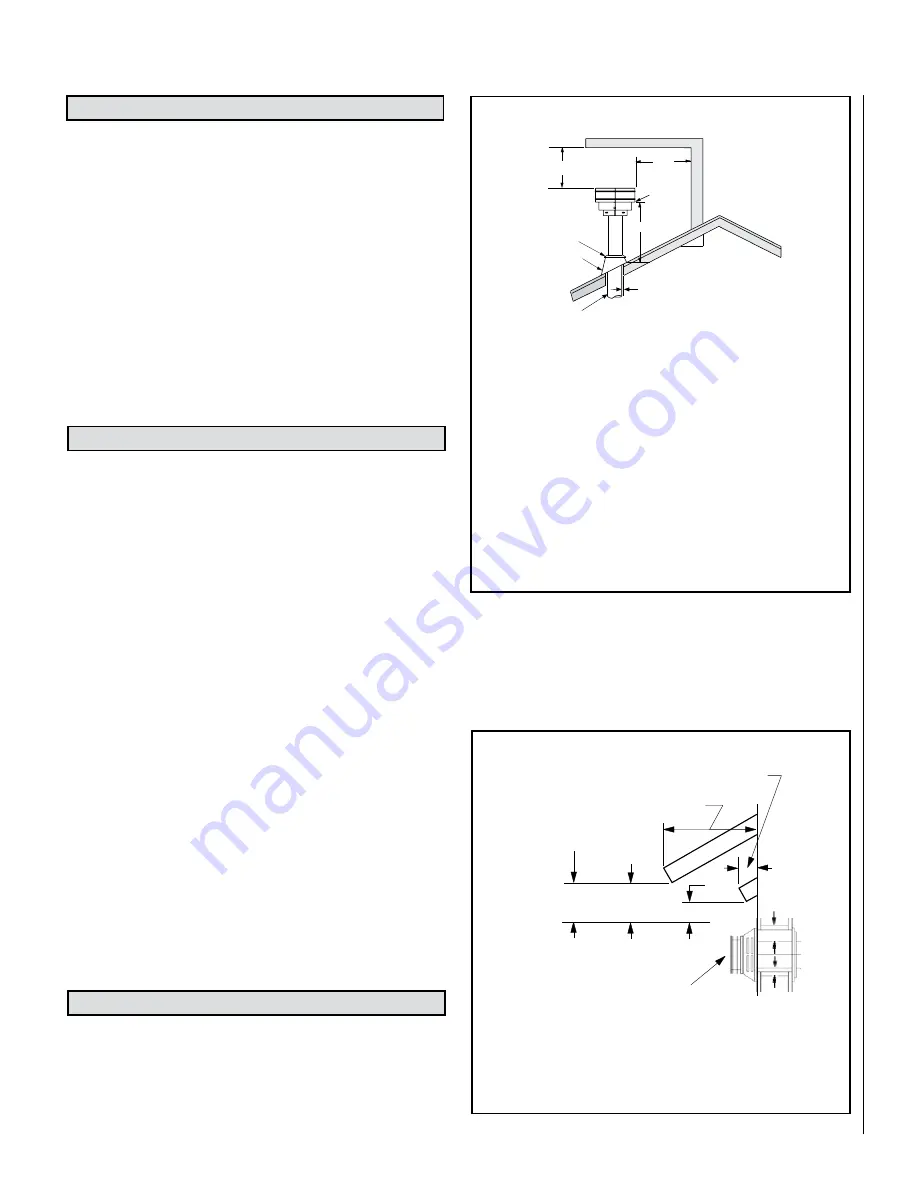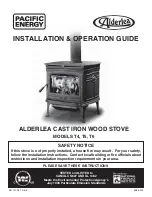
9
NOTE: DIAGRAMS & ILLUSTRATIONS ARE NOT TO SCALE.
12
X
Roof Pitch is X/12
2 FT
MIN.
2 FT MIN.
Lowest
Discharge
Opening
H*
*H = MINIMUM HEIGHT FROM ROOF TO
LOWEST DISCHARGE OPENING OF VENT
TERMINATION HEIGHTS FOR VENTS ABOVE
FLAT OR SLOPED ROOFS
Horizontal Overhang
Vertical
Wall
Vent
Termination
Storm Collar
Concentric
Vent Pipe
Flashing
1 inch (25.4 mm) Minimum
Clearance to Combustibles
The vent/air intake termination clearances
above the high side of an angled roof is as
follows:
Roof Pitch.................. Feet
Meters
Flat to 6/12 ................ 1.0
0.3
6/12 to 7/12 ............... 1.25
0.38
7/12 to 8/12 ............... 1.5
0.46
8/12 to 9/12 ............... 2.0
0.61
9/12 to 10/12 ............. 2.5
0.76
10/12 to 11/12 ........... 3.25
0.99
11/12 to 12/12 ........... 4.0
1.22
12/12 to 14/12 ........... 5.0
1.52
14/12 to 16/12 ........... 6.0
1.83
16/12 to 18/12 ........... 7.0
2.13
18/12 to 20/12 ........... 7.5
2.29
21/12 to 21/12 ........... 8.0
2.44
Figure 4
Figure 3
Vertical Vent Termination Clearances
These instructions should be used as a guideline and do not supersede
local codes in any way. Install vent according to local codes, these
instructions, the current National Fuel Gas Code (ANSI-Z223.1) in the
USA or the current standards of CAN/CSA-B149.1 in Canada.
Horizontal Vent Termination Clearances
The horizontal vent termination must have a minimum of 3" (76 mm)
clearance to any overhead combustible projection of 2-1/2" (64 mm)
or less. See
Figure 4
. For projections exceeding 2-1/2" (64 mm), For
additional vent location restrictions refer to
Figure 5
.
Side Elevation View
3"
(76 mm)
12"
(305 mm)
Horizontal T
Combustible Projection
greater than 2 1/2 inches in length
Horizontal Vent Termination Clearances
Combustible Projection
2 1/2
inches or less in length
18"
(457 mm)
Ventilated
Soffit
Unventilated
Soffit
ermination Kit
3"
(76 mm)
1"
(25 mm)
Note - See vent manufacturer's instructions for recess
allowances, into exterior walls for the horizontal
termination caps.
MANUFACTURED (MOBILE) HOME REQUIREMENTS
QUESTIONS TO ASK LOCAL BUILDING OFFICIAL
VENT TERMINATION CLEARANCES
These models may be installed in an aftermarket permanently
located, manufactured home, where not prohibited by local codes.
When installed in Manufactured Housing the following supplemental
requirements must be met:
• The appliance must be secured to the floor (i.e. use (4) 1/4" x 2-3/4"
bolts and nuts or equivalent. Note: Not included) for securing appliance
to the manufactured home floor.
• The appliance must be grounded to the chassis of the manufactured
home. Use a No. 8 or heavier copper wire at least 18” in length.
• The structural integrity of the manufactured home floor, walls, ceiling
and roof must be maintained.
• A manufactured (mobile) home installation must conform with the
Manufactured Home Construction and Safety Standard, Title 24 CFR,
Part 3280, or, when such a stan-dard is not applicable, the Standard
for Manufactured Home Installations, ANSI / NCSBCS A225.1, or
standard for Gas equipped Recreational Vehicles and Mobile Housing,
CSA Z240.4.
This appliance must be installed per manufacturers’ instructions.
Installations must conform to appropriate local codes and applicable state
and federal requirements. Familiarity with these requirements before
installation is essential. Some important considerations to discuss with
local building officials include:
1. Applicable codes (i.e. Uniform Mechanical Code, State or Regional
Gas Codes, National Fuel Gas Code)
2. Local amendments
3. Recognized testing lab: OMNI-Test Laboratories Inc.; Beaverton,
Oregon
4. Is a permit required - cost?
5. In some states or municipalities, a licensed gas fitter or plumber may
be required to install this appliance. Check with your local building
official for requirements in your area (i.e. Is a license required for
installation of gas supply line)?
6. Maximum amount of gas pipe without a pressure test - type of test
required?
7. Are below grade penetrations of the gas line allowed?
8. Is concealed gas piping allowed?
9. Specific requirements of concealed fittings?
10. Is rigid pipe to appliance required?
11. Allowed piping materials?
12. Shut-off valve required within 4 feet of the firebox?
13. May the shut-off valve be concealed?
14. Rooms where the installation is not allowed?
In the absence of local codes, installation should conform to National
Fuel Gas Code, ANSI Z223.1 / NFPA 54-Latest Edition in the USA or
National Fuel Gas Code,
CAN/CSA-B149.1
-Latest Edition in Canada.
Summary of Contents for CI1500DVF Series
Page 25: ...25 notes ...










































